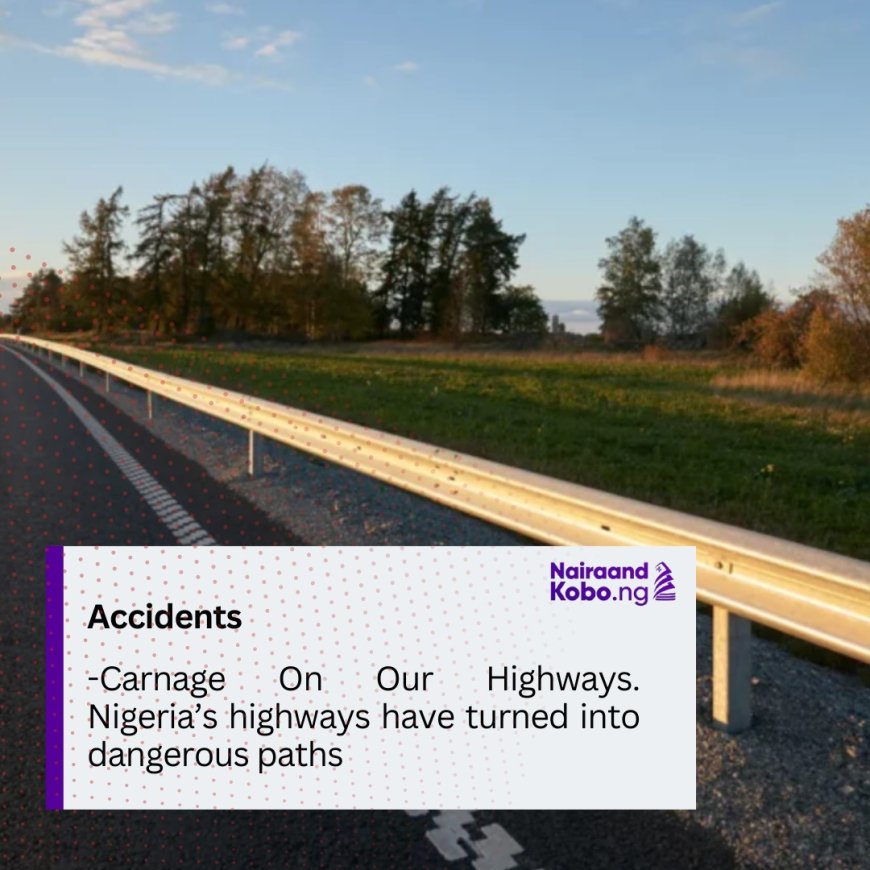Carnage On Our Highways

Nigeria’s highways have turned into dangerous paths, claiming the lives of many. The recent accident in Kaduna State, where 40 people, mostly children, died during the Eid-el-Maulud celebration, was not an isolated event.
The bus they were travelling in collided with a truck on the Saminaka Road in Lere local government area.
Only days earlier, another tragic crash in Niger State claimed 48 lives after a petrol tanker collided with a truck, leading to a devastating explosion.
A month before that, multiple accidents in Oyo and Ogun States took 37 lives, with 25 fatalities occurring in a single day along the Ibadan-Lagos Expressway.
These are not mere statistics – they represent human lives lost to preventable incidents.
Despite a slight reduction in road traffic fatalities in 2023, with 5,081 deaths reported by the Federal Road Safety Corps (FRSC) compared to 6,456 in 2022, the overall death toll remains alarming.
Nigeria has one of the highest road fatality rates globally, with 33.7 deaths per 100,000 people, far above the global average of 17.4.
To put that into perspective, the global average is 17.4 per 100,000, with Zimbabwe, the worst-ranked country, experiencing 74.5 deaths per 100,000.
The causes of these road tragedies are numerous and familiar. Over-speeding is the leading factor, as drivers routinely ignore speed limits, often in pursuit of higher profits, especially in commercial transportation.
Reckless driving, fatigue, overloaded vehicles, and dangerous night-time travel further escalate the risks. In recent years, the increased use of mobile phones while driving has worsened the situation, with distracted drivers causing more accidents. Whether taking calls, texting, or scrolling through social media, these distractions have proven deadly.
The poor state of Nigeria’s roads adds to the problem. Highways are often riddled with potholes, poorly lit, and lacking proper signage, making even the most careful drivers vulnerable. These infrastructural issues, combined with reckless driving behaviour, create a lethal environment.
While individual drivers are frequently blamed, the systemic failures in addressing road safety are equally concerning.
Sadly, traffic enforcement in Nigeria has shifted focus from serious safety measures to minor infractions like expired vehicle papers, turning into a revenue-generating scheme rather than a life-saving mission.
The country’s outdated approach to road safety is woefully inadequate. In other parts of the world, technology has played a significant role in reducing road fatalities through the use of speed cameras, real-time traffic monitoring, and emergency response systems. In Nigeria, these advancements are scarce, leaving the roads more dangerous than they should be.
Driver education is another critical issue. Nigeria’s licensing system is rife with corruption, allowing unqualified drivers to obtain licenses without undergoing proper training. Bribery often bypasses the need for testing, leading to untrained drivers endangering the lives of others. A complete overhaul of the licensing process is necessary, emphasising proper education and rigorous testing.
The human cost of road accidents in Nigeria is devastating. Road crashes have become the second leading cause of violent deaths, surpassed only by violence from insurgent groups such as Boko Haram and bandits. While much attention is given to these security challenges, the loss of life on Nigeria’s roads is equally tragic.
The economic impact of road accidents is also significant. Hospitals, already burdened by limited resources, are overwhelmed by crash victims. Families face financial ruin from the loss of breadwinners, and businesses suffer disruptions to supply chains and workforce mobility.
There are urgent steps the government must take. First, investment in road infrastructure is essential. Highways need regular maintenance, potholes must be repaired, proper lighting should be installed, and signage needs to be clear and informative. These basic improvements can make a significant difference in preventing accidents.
Technology should also play a more prominent role in road safety efforts. Installing speed cameras, especially in high-risk areas, would discourage speeding and reckless driving. Emergency response units should be stationed along major highways, ready to respond quickly and efficiently to accidents.
Stricter enforcement of traffic laws is another crucial step. The FRSC and other oversight bodies must be empowered and held accountable for ensuring compliance with road safety regulations. This includes cracking down on over-speeding, drunk-driving, and distracted driving. Penalties for violations should be severe enough to serve as a deterrent, with repeat offenders facing escalating consequences.
Driver education is equally important. The current licensing system must be replaced with a standardised, rigorous process that emphasises road safety and accountability. Drivers should be required to pass comprehensive tests and undergo training that instills a culture of safety on the roads. Public awareness campaigns must be intensified to educate road users about the dangers of negligence and recklessness.









